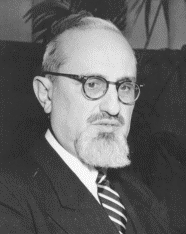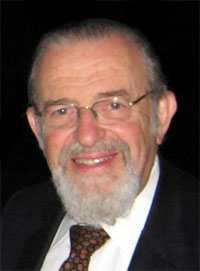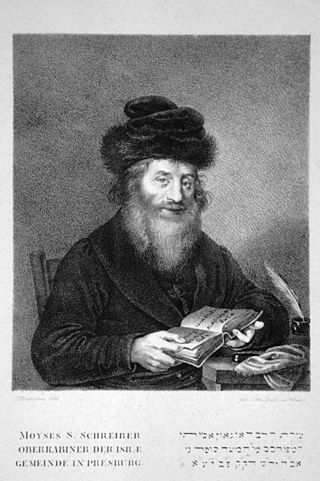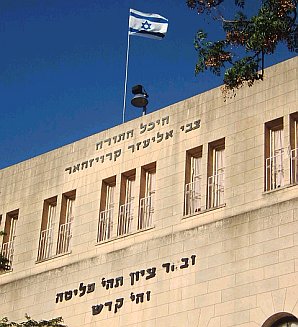Related Research Articles

Women in Judaism have affected the course of Judaism over millenia. Their role is reflected in the Hebrew Bible, the Oral Law, by custom, and by cultural factors. Although the Hebrew Bible and rabbinic literature present various female role models, religious law treats women in specific ways. According to a 2017 study by the Pew Research Center, women account for 52% of the worldwide Jewish population.

A kollel is an institute for full-time, advanced study of the Talmud and rabbinic literature. Like a yeshiva, a kollel features shiurim (lectures) and learning sedarim (sessions); unlike most yeshivot, the student body of a kollel typically consists mostly of married men. A kollel generally pays a regular monthly stipend to its members.

Abraham Isaac Kook, known as HaRav Kook, and also known by the Hebrew-language acronym Hara'ayah, was an Orthodox rabbi, and the first Ashkenazi Chief Rabbi of British Mandatory Palestine. He is considered to be one of the fathers of religious Zionism and is known for founding the Mercaz HaRav Yeshiva.

Joseph Ber Soloveitchik was a major American Orthodox rabbi, Talmudist, and modern Jewish philosopher. He was a scion of the Lithuanian Jewish Soloveitchik rabbinic dynasty.

Norman Lamm was an American Modern Orthodox rabbi, scholar, academic administrator, author, and Jewish community leader. He was the Chancellor of Yeshiva University until he announced his retirement on July 1, 2013.

Moses Schreiber (1762–1839), known to his own community and Jewish posterity in the Hebrew translation as Moshe Sofer, also known by his main work Chatam Sofer, Chasam Sofer, or Hatam Sofer, was one of the leading Orthodox rabbis of European Jewry in the first half of the nineteenth century.
Abraham ben Abraham, also known as Count Valentine Potocki, was a purported Polish nobleman (szlachta) of the Potocki family who converted to Judaism and was burned at the stake by the Roman Catholic Church because he had renounced Catholicism and had become an observant Jew. According to Jewish oral traditions, he was known to the revered Talmudic sage, the Vilna Gaon, and his ashes were interred in the relocated grave of the Vilna Gaon in Vilna's new Jewish cemetery.

Shlomo Goren, was a Polish-born Israeli rabbi and Talmudic scholar. An Orthodox Jew and Religious Zionist, he was considered a foremost rabbinical legal authority on matters of Jewish religious law (halakha). In 1948, Goren founded and served as the first head of the Military Rabbinate of the Israel Defense Forces (IDF), a position he held until 1968. Subsequently, he served as Chief Rabbi of Tel Aviv–Jaffa between 1968 and his 1972 election as the Chief Rabbi of Israel; the fourth Ashkenazi Jew to hold office. After his 1983 retirement from the country's Chief Rabbinate, Goren served as the head of a yeshiva that he established in Jerusalem.

Yisrael Noah Weinberg was an Orthodox rabbi and the founder of Aish HaTorah.

Moetzes Gedolei HaTorah is the supreme rabbinical policy-making council of the Agudat Yisrael and Degel HaTorah movements in Israel; and of Agudath Israel of America in the United States. Members are usually prestigious Roshei Yeshiva or Hasidic rebbes, who are also usually regarded by many Haredi Jews to be the Gedolim ("great/est") sages of Torah Judaism. Before the Holocaust, it was the supreme authority for the World Agudath Israel in Europe.

Moshe Feinstein was a Russian-born American Orthodox Jewish rabbi, scholar, and posek. He has been called the most famous Orthodox Jewish legal authority of the twentieth century and his rulings are often referenced in contemporary rabbinic literature. Feinstein served as president of the Union of Orthodox Rabbis, Chairman of the Council of the Moetzes Gedolei HaTorah of the Agudath Israel of America, and head of Mesivtha Tifereth Jerusalem in New York.

From the founding of political Zionism in the 1890s, Haredi Jewish leaders voiced objections to its secular orientation, and before the establishment of the State of Israel, the vast majority of Haredi Jews were opposed to Zionism, like early Reform Judaism, but with distinct reasoning. This was chiefly due to the concern that secular nationalism would redefine the Jewish nation from a religious community based in their alliance to God for whom adherence to religious laws were "the essence of the nation's task, purpose, and right to exists," to an ethnic group like any other as well as the view that it was forbidden for the Jews to re-constitute Jewish rule in the Land of Israel before the arrival of the Messiah. Those rabbis who did support Jewish resettlement in Palestine in the late 19th century had no intention to conquer Palestine and declare its independence from the rule of the Ottoman Turks, and some preferred that only observant Jews be allowed to settle there.
Open Orthodox Judaism is a Jewish religious movement with a commitment to following halacha, increased emphasis on intellectual openness, and a more expansive role for women. The term was coined in 1997 by Avi Weiss, who views halacha as permitting more flexibility than the normal practices of Orthodox Judaism.
Gateshead Talmudical College, popularly known as Gateshead Yeshiva, is located in the Bensham area of Gateshead in North East England. It is the largest yeshiva in Europe and considered to be one of the most prestigious advanced yeshivas in the Orthodox world. The student body currently numbers approx. 350. Although students are mainly British, there are European, American, Canadians as well as some from South America, Australia and South Africa. Most students are Litvish, but up to a third are Chasidic.

David Hanoch Yitzchak Bar-Hayim is an Israeli rabbi who heads the Shilo Institute, a Jerusalem-based rabbinical court and institute of Jewish education dedicated to the Torah of Israel.
In Jewish law, a posek is a legal scholar who determines the application of halakha, the Jewish religious laws derived from the written and Oral Torah, in cases of Jewish law where previous authorities are inconclusive, or in those situations where no clear halakhic precedent exists.

Orthodox Jewish philosophy comprises the philosophical and theological teachings of Orthodox Judaism. Though Orthodox Judaism sees itself as the heir of traditional rabbinic Judaism, the present-day movement is thought to have first formed in the late 18th century, mainly in reaction to the Jewish emancipation and the growth of the Haskalah and Reform movements. Orthodox Jewish philosophy concerns itself with interpreting traditional Jewish sources, reconciling the Jewish faith with the changes in the modern world and the movement's relationships with the State of Israel and other Jewish denominations.
Yeshivat Maharat is a fringe and controversial Jewish educational institution in The Bronx, New York, which is the first Orthodox yeshiva in North America to ordain women. The word Maharat is a Hebrew acronym for phrase manhiga hilkhatit rukhanit Toranit, denoting a female "leader of Jewish law spirituality and Torah". Semikha is awarded to graduates after a 3- or 4-year-long program composed of intensive studies of Jewish law, Talmud, Torah, Jewish thought, leadership training, and pastoral counseling. The ordination functions as a credentialed pathway for women in the Jewish community to serve as clergy members.
Shuvu Chazon Avrohom, often referred to by its former names Shuvu or The United Fund for the Education of Russian Immigrant Children in Israel, is an Orthodox Jewish kiruv organization in Israel. It was founded by Rabbi Avrohom Yaakov Pam as a network of schools, summer camps, and after school programs for immigrant children from the Former Soviet Union. Its enrollment has since expanded to include many Israelis from birth as well as immigrants from all over the world.

Alan Abraham Kimche is a British-Israeli Orthodox rabbi and community leader. He was the rabbi of the Ner Yisrael Synagogue in Hendon, London, until his retirement in 2019. He currently works as a teacher, writer, and lecturer in Israel.
References
- ↑ A timid hero
- ↑ Jewish tradition & Halacha have become stagnant: An Interview with Rabbi Nathan Lopes Cardozo
- ↑ "Faculty and Staff". David Cardozo Academy. Retrieved 21 February 2016.
- ↑ "The Kosher Bookworm An autobiography by a Jew who never should have been". The Jewish Star. Retrieved 21 February 2016.
- ↑ https://www.thetorah.com/author/nathan-lopes-cardozo [ bare URL ]
- ↑ RABBI WANTS SHABBAT RESTAURANTS AND TRANSPORT
- ↑ An interview with Rabbi Cardozo: Taking issue
- ↑ Lonely but Not Alone: A film on the incredible life of Rabbi Dr. Nathan Lopes Cardozo – Q&A
- ↑ Gordimer, Avrohom. "No, Rabbi Cardozo, the Torah is Not Flawed". Cross-Currents.
- ↑ "The Jerusalem Post - Nathan Lopes Cardozo". The Jerusalem Post | Jpost.com. Retrieved 21 February 2016.
- ↑ "The Philosophy and Purpose of Thoughts to Ponder". 3 June 2021. Retrieved 7 March 2022.
- ↑ "My Chareidi and Modern Orthodox Struggles" . Retrieved 7 March 2022.
- ↑ "Faith & Defiance - Chapter 8: Making Sense of a Mixed Marriage" . Retrieved 7 March 2022.
- ↑ Chapter 11: My Father, Spinoza and I
- ↑ Jewish tradition & Halacha have become stagnant: An Interview with Rabbi Nathan Lopes Cardozo
- ↑ "Books authored by Cardozo". Amazon. Retrieved 21 February 2016.
- ↑ "ContentsNBCtext". www.nehalel.com. Retrieved 2016-08-14.
- ↑ "Rabbi Nathan Lopes Cardozo's Foreword to A Damaged Mirror". Archived from the original on 2016-08-29. Retrieved 2016-08-14.
- ↑ "Lonely But Not Alone: A Spiritual Autobiography"
- ↑ A timid hero